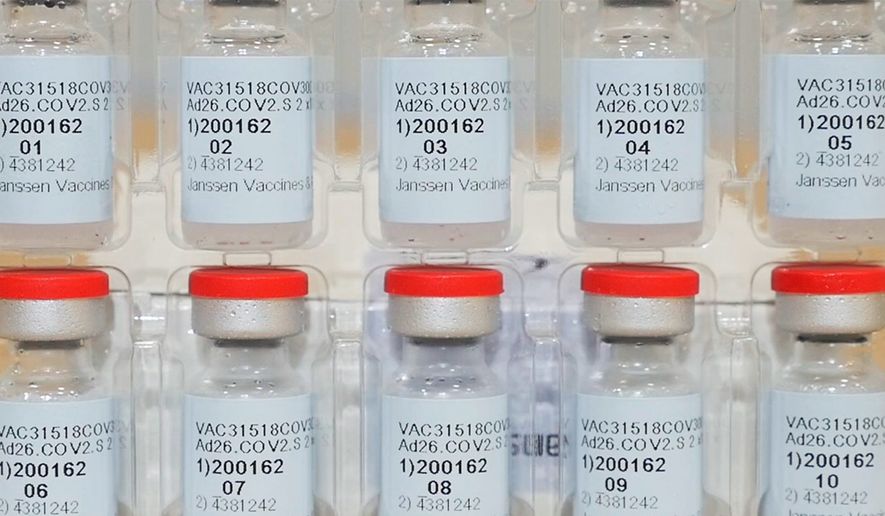Catholic leaders are urging the faithful to avoid the Johnson & Johnson coronavirus vaccine if they can because it is produced using cell lines derived from abortions decades ago.
But the vaccines themselves do not contain fetal tissue and the manufacturing lines use lab-grown cells — not the initial tissue.
“There is no remnant of the original abortion in the cell line,” said Barry Bloom, former dean and Joan L. and Julius H. Jacobson professor of public health at the Harvard T.H. Chan School of Public Health.
The Vatican in December said it is “morally acceptable” to get COVID-19 vaccines, citing the harm from the pandemic and the fact that recipients did not play a role in the long-ago abortions that sparked the cell lines. But the Archdiocese of New Orleans kicked off a debate this week by dubbing the J&J vaccine “morally compromised,” as the Catholic Church opposes abortion.
The U.S. Conference of Catholic Bishops followed suit by saying “if one has the ability to choose a vaccine, Pfizer or Moderna’s vaccines should be chosen over Johnson & Johnson’s.”
The debate is swirling even as federal and state officials urge Americans to take whatever vaccine they can, including the newly approved J&J vaccine.
The J&J version requires one dose instead of two and should accelerate efforts to wrangle the deadly pandemic. An initial shipment of nearly 4 million doses went out this week.
Earlier vaccines approved in the U.S. — from Pfizer-BioNTech and Moderna — use “messenger-RNA,” or snippets of genetic code encapsulated in bubbles of fat that teach the body to attack the virus by creating impostors of the spike proteins that give the coronavirus its name.
Catholic leaders noted that Pfizer and Moderna used fetal cell lines in early testing. But they’re targeting the J&J vaccine because fetal cell lines are used in manufacturing.
J&J’s vaccine uses an adenovirus vector — essentially an inactivated cold virus — that is grown and replicated in “immortalized” fetal cell lines before being pulled out and filtered from the final product.
Scientists generated the cell lines from elective abortions in the 1970s and 1980s, and they are commonly used in medical manufacturing.
The current cells are lab-grown clones, so they are, in a sense, many generations removed from the original tissue.
“They are cell lines whose ultimate origin was from an aborted fetus. The cells continue to grow, divide, proliferate — used in other vaccines as well,” said Amesh Adalja, a senior scholar at the Johns Hopkins Center for Health Security.
Dr. Bloom said vaccine makers use the cell lines because they act as a factory that can grow massive quantities of the adenovirus vector.
“The challenge is to find cells that will grow in very large amounts over very long periods of time that can be standardized,” he said. “The fact that every company working with adenoviruses works with something like this cell line indicates it’s very, very special.”
Still, the origins of the line are a problem for some Catholics.
“The approval of Johnson & Johnson’s COVID-19 vaccine for use in the United States again raises questions about the moral permissibility of using vaccines developed, tested and/or produced with the help of abortion-derived cell lines,” the U.S. bishops said.
For its part, J&J is highlighting that “there is no fetal tissue in the vaccine.”
“We are able to manufacture hundreds of millions of doses using our engineered cell-line system and look forward to delivering those doses around the world and help meet the critical need,” the company said.
The head of the Catholic Church, Pope Francis, has been vocal about the need to vaccinate the world against the coronavirus.
The Vatican in December said “it is morally acceptable to receive COVID-19 vaccines that have used cell lines from aborted fetuses in their research and production process.”
The statement was issued shortly after vaccines from Pfizer and Moderna were approved for emergency use in the U.S., though months before J&J’s shot got the green light.
Dr. Bloom said the pope appeared to recognize that many lives would be saved by adenovirus vaccines, including the AstraZeneca vaccine that has been earmarked for use in much of the developing world.
The pope’s instruction, or Congregation for the Doctrine of the Faith, says a person who uses the vaccines “does not constitute formal cooperation with the abortion from which the cells used in production of the vaccines derive.”
“I think for people of conscience that’s a very important statement,” Dr. Bloom said. “The fact this is a single immortalized cell line means you never have to go back to any further abortion to make this vaccine.”
Federal officials said states across the U.S. administered the first J&J shots on Tuesday.
The White House is toasting an agreement between J&J and fellow pharmaceutical giant Merck, which agreed to churn out its rival’s vaccine at two of its facilities. The administration says that cooperation will speed up supply as it tries to produce enough vaccines for every adult who wants one by the end of May.
Florida Gov. Ron DeSantis on Wednesday said the one-shot J&J vaccine will help Florida to vaccinate its teachers, first responders and police officers over age 50.
“I think we can get through a lot of these people very quickly,” Mr. DeSantis, a Republican, said in Pasco County.
The U.S. bishops’ conference did not rule out the J&J shot if no alternative is available. They also said getting vaccinated can serve the greater good.
“While we should continue to insist that pharmaceutical companies stop using abortion-derived cell lines, given the world-wide suffering that this pandemic is causing, we affirm again that being vaccinated can be an act of charity that serves the common good,” the conference said.
• Tom Howell Jr. can be reached at thowell@washingtontimes.com.




Please read our comment policy before commenting.